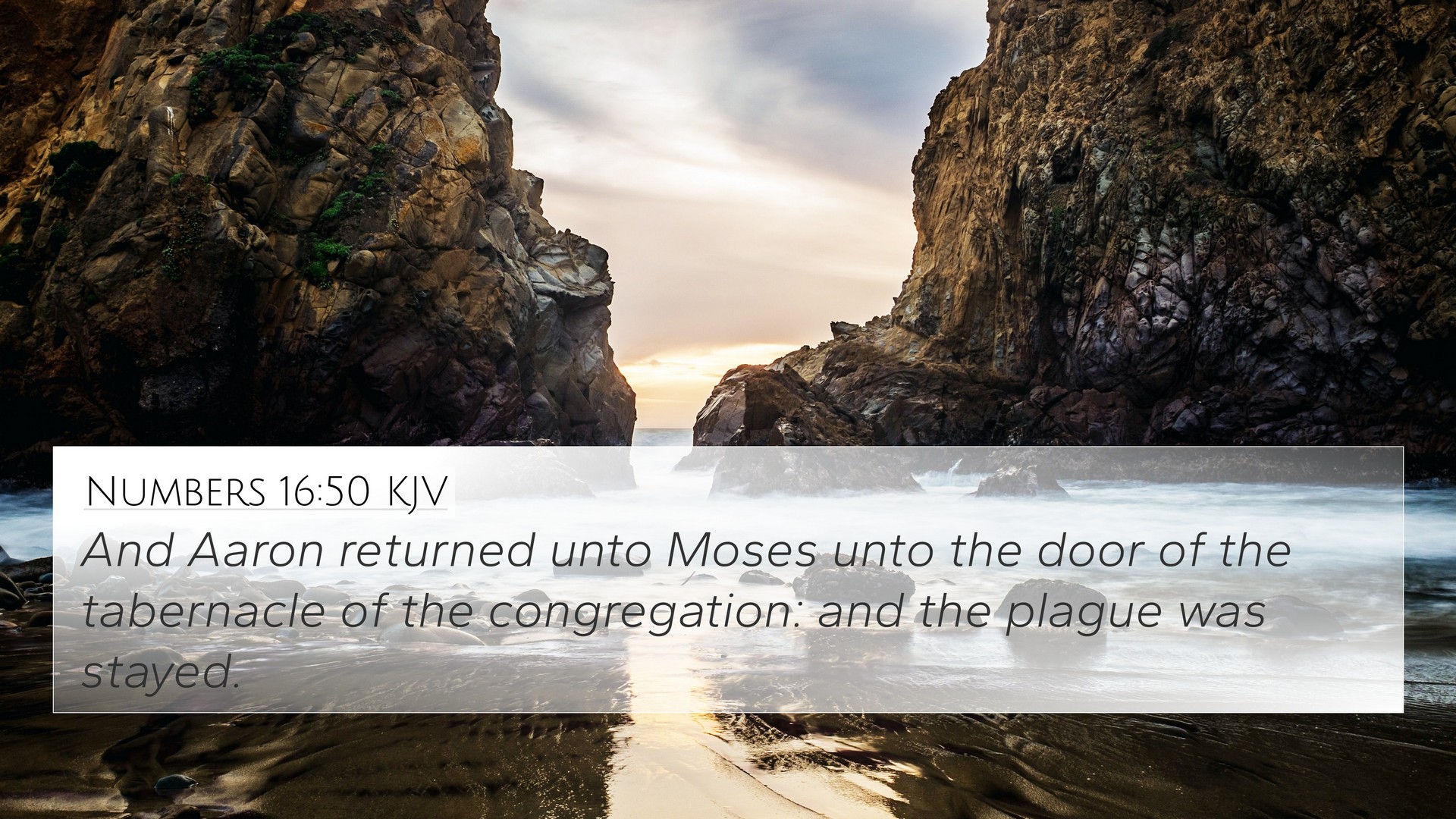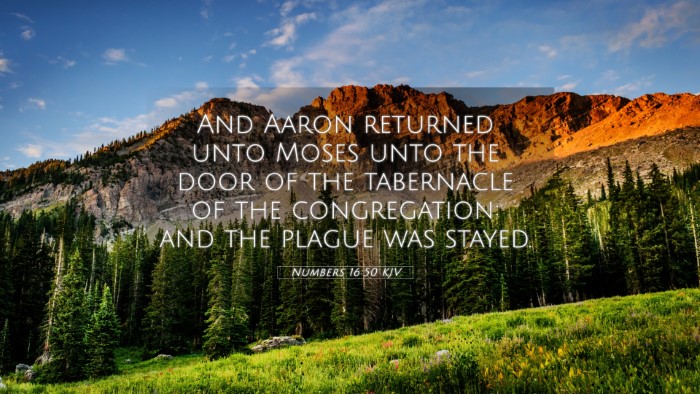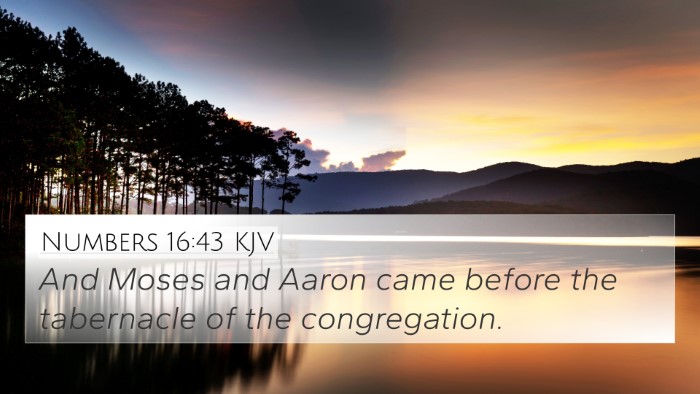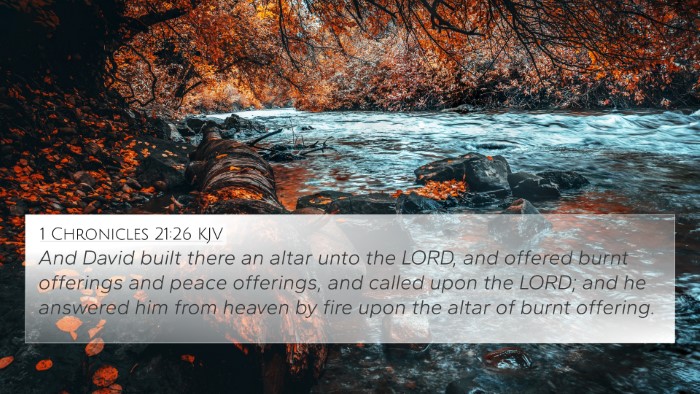Understanding Numbers 16:50
The verse Numbers 16:50 states: “And Aaron returned unto Moses unto the door of the tabernacle of the congregation: and the plague was stayed.” This scripture holds significant theological and historical implications within the narrative of the Israelites’ journey. Below, we explore the meaning of this verse through insights from various public domain commentaries, specifically those by Matthew Henry, Albert Barnes, and Adam Clarke.
Verse Context and Background
This verse occurs in the context of a rebellion against Moses and Aaron led by Korah and his followers. The consequences of this rebellion are severe, resulting in a divine plague. The resolution of this situation is signified by Aaron’s mediation role, illustrating the theme of priestly intercession.
Key Insights from Commentaries
-
Matthew Henry’s Commentary:
Henry emphasizes the mercy of God in the context of sin and how the plague’s cessation symbolizes a return to divine favor. He highlights Aaron’s position as the high priest, serving not only as a leader but also as a mediator between God and the people.
-
Albert Barnes’ Notes:
Barnes notes that Aaron’s return to Moses at the tabernacle signifies a restoration of communication and authority. The cessation of the plague stresses the importance of intercession and reminds believers of the effectiveness of prayer and supplication.
-
Adam Clarke’s Commentary:
Clarke focuses on the symbolic act of returning to the tabernacle, interpreting it as an act of repentance and humility. He argues that this return signifies the acknowledgment of God’s justice and the necessity of humbling oneself before the Lord to avert judgment.
Thematic Connections
In exploring the meaning of Numbers 16:50, it is vital to place it in the expansive framework of scripture to understand its thematic connections. Here, we will identify several biblical cross-references that illuminate this verse:
- Exodus 32:11-14: The plea of Moses as a mediator for the Israelites mirrors Aaron's intercession.
- Hebrews 5:1: This New Testament verse discusses the role of priests, linking to Aaron's priestly duties in Numbers.
- 1 Timothy 2:5: Jesus as the ultimate mediator highlights the continuity of the intercessory role God established through Aaron.
- Psalms 106:23: This passage reflects on Moses’ intercessions and God’s mercy, reinforcing the theme seen in Aaron's actions.
- Lamentations 3:22-23: The concept of God's mercy and faithfulness connects with the stopping of the plague, illustrating hope amidst judgment.
- James 5:16: This verse emphasizes the power of prayer, echoing Aaron's intercessory effectiveness during the plague.
- Matthew 5:23-24: The idea of reconciliation, akin to Aaron’s role, resonates throughout the teaching of Jesus.
Significance of Cross-Referencing
Cross-referencing biblical texts is a beneficial tool for understanding the deeper meanings behind scripture. Through cross-reference Bible studies, believers can uncover thematic connections and see how various passages interact and illuminate each other. The process transforms solitary verses into parts of a grand narrative.
For instance, connecting Numbers 16:50 with the New Testament shows how the themes of intercession and divine mercy evolve within the broader biblical scope. Recognizing these connections not only enriches personal study but also enhances understanding for sermon preparation and teaching.
Practical Application of Cross-Referencing
To utilize biblical cross-referencing effectively, consider the following:
- Bible Concordance: Use a concordance to identify related verses based on specific keywords.
- Bible Reference Resources: Leverage various biblical reference materials that provide connections and thematic analyses.
- Cross-Reference Guides: Employ guides that outline how specific verses correlate and their significance within the biblical narrative.
- Contextual Studies: Engage in studies that explore the background and historical circumstances of scripture, enhancing understanding through comparative analysis.
Conclusion
Numbers 16:50 serves as a poignant reminder of the importance of leadership, intercession, and divine mercy within the biblical narrative. Understanding this verse through the insights of different commentaries and its connections to other scriptures underscores the intricate tapestry of God’s message throughout the Bible. By harnessing the tools for Bible cross-referencing and engaging with interconnected themes, believers can deepen their knowledge and relationship with God’s Word.
In summary, Numbers 16:50 not only illustrates the unique role of the high priest but also encourages a deeper exploration of scripture through thematic connections and cross-referencing, enhancing the overall understanding of biblical teachings.




